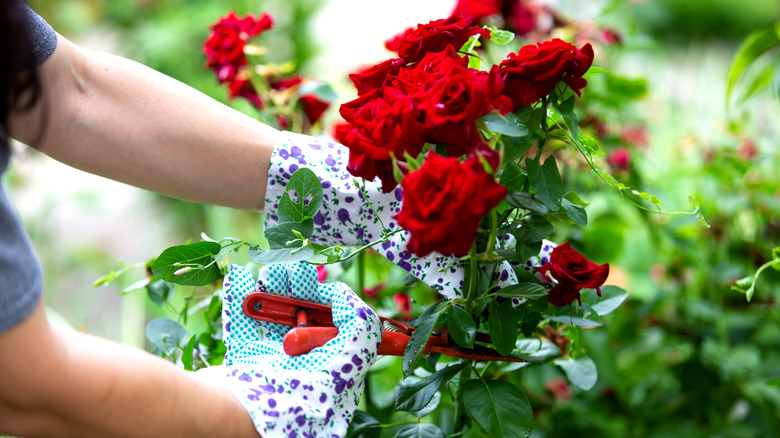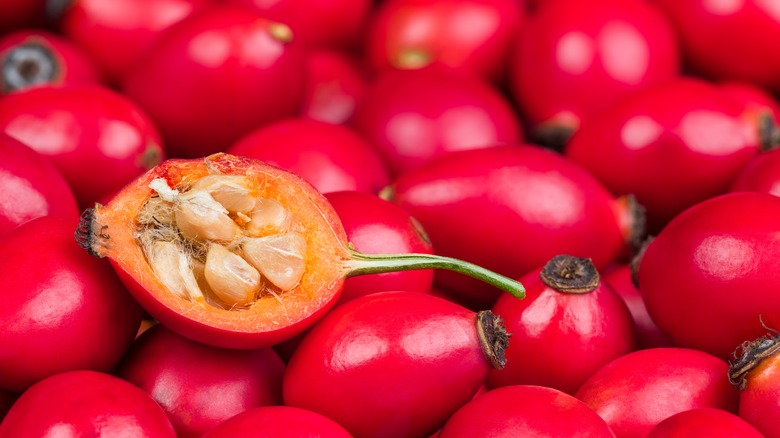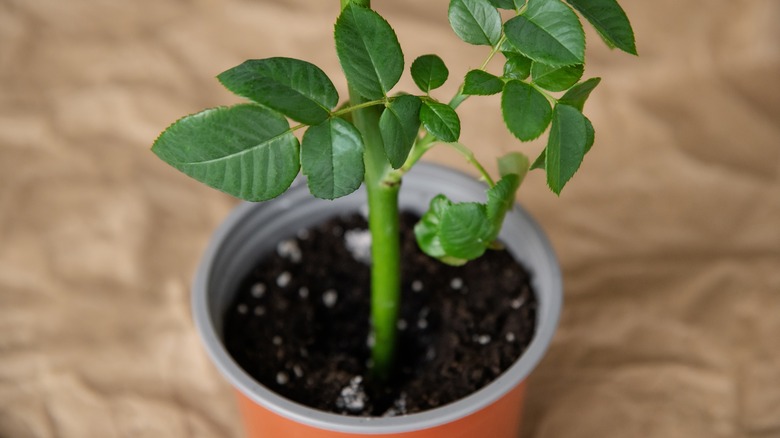Tips & Tricks For Growing Beautiful Roses From Seeds
Growing flowers from seeds can be a great way to save money, and different rose varieties can make your garden smell heavenly. However, growing roses from the seed is probably not the best idea for the inexperienced or impatient gardener. If this sounds like you, growing roses from cuttings may be the better option. But, if you do decide to grow your own roses from seed, you might want to know this important information. House Digest spoke exclusively with Shirley Bovshow, award-winning garden designer from Eden Maker, to learn the best tips and tricks for growing rose seeds.
"I want to start by saying that growing rose plants from seed is not a beginner gardener project!" Bovshow said. "Growing a rose plant from seed will yield inconsistent results and no two seed-grown roses (from the same pod) will look identical! This is why even commercial rose growers use propagation methods like growing from cuttings, grafting, or tissue culture." When using these propagation methods, you get more consistent results and know that your plant will look nearly identical to the mother plant, but this isn't to say that growing roses from seeds should be entirely avoided altogether. "If you have time and patience to grow a rose plant from seed, it could be exciting to see what random results are produced, and it's free! But there are specific steps that shouldn't be overlooked," she said.
Be patient while you wait for the roses to grow
There are some serious mistakes you want to avoid if you want long-lasting roses. But, the most common mistake that gardeners make when growing roses from the seed is not stratifying the seeds first. In Bovshow's exclusive interview with House Digest, she said, "Stratification is subjecting the seeds to very cold temperatures to mimic nature. You can place the seeds in the refrigerator for 30 to 60 days. Many first-time growers skip this vital step, resulting in poor or no germination. Stratification breaks seed dormancy, allowing them to sprout. Without this cold treatment, rose seeds will remain dormant and fail to grow."
It's also important to note that the germination process for these flowers is much longer than you might expect. Bovshow shared, "Seed-grown roses can take weeks or even months to sprout, where other flowers often germinate in a few days or weeks." And, after all this waiting time, you will not be sure of the end results until your flower begins to bloom. The garden designer says that roses grown from seeds can have "great variation in color, shape, and size."
Special tricks to help seed-grown roses bloom
With different growing advice all around you, it's difficult to know what to do and what to avoid. In an exclusive interview with House Digest, Bovshow shared a trick to help grow rose seeds that you won't want to skip. "A little-known trick is to soak rose seeds in a solution of hydrogen peroxide before stratification. Soak the seeds in a 3% hydrogen peroxide solution for 24 hours before placing them in the refrigerator for stratification. This helps to disinfect the seeds, which helps to increase germination rates by reducing the risk of fungal diseases!" Continue to check your plants for said diseases, such as black spot and powdery mildew, as they begin to grow. "Also, scarifying the seeds by gently nicking or sanding the seed coat before soaking can help speed up the germination process by allowing water to penetrate the seed more easily," she said.
When growing your roses, it's also important to make sure you have the right soil and place the plants apart at a proper distance. "Use well-drained soil rich in organic matter (like compost). This allows seedlings to establish strong root systems early on," Bovshow shared. "Make sure to provide space between seedlings to avoid competition for nutrients and sunlight. Plant the seeds about ¼ inch deep in the soil, and lightly cover them. Avoid planting them too deeply, as they need some light to germinate." In the meantime, while you are waiting for your new roses to bloom, take a moment to admire all the other varieties of stunning roses you can grow in your garden.


